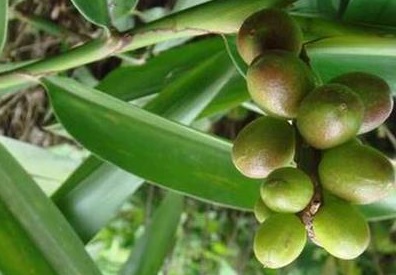Nikhil Prasad Fact checked by:Thailand Medical News Jun 28, 2025 7 months, 2 weeks, 2 days, 5 hours, 2 minutes ago
Thailand Medical News: A humble fruit used in traditional Chinese medicine for centuries could soon become a modern-day treatment for serious brain disorders like Alzheimer’s, Parkinson’s, and depression. A new review by scientists from Zhejiang Sci-Tech University in Hangzhou, China, sheds light on the powerful neuroprotective effects of Alpiniae oxyphyllae Fructus (AOF), the dried fruit of a ginger-family plant also known in Chinese as Yizhiren.
 Herb from Ginger Family Could Help Fight Brain Disorders Naturally
Herb from Ginger Family Could Help Fight Brain Disorders Naturally
This
Thailand Medical News report reveals how AOF, once used primarily to treat urinary and digestive problems, is now being studied extensively for its ability to protect brain cells, reduce inflammation in the nervous system, combat oxidative stress, and even regenerate nerve pathways. The herb’s compounds, such as nootkatone (NKT), chrysin, protocatechuic acid (PCA), and oxyphylla A, work through multiple pathways that target the root causes of neurodegeneration.
Healing Through Ancient Wisdom and Modern Science
According to the researchers, AOF contains powerful anti-inflammatory molecules called sesquiterpenoids. In lab tests, these compounds blocked harmful substances like nitric oxide (NO), tumor necrosis factor-alpha (TNF-α), and interleukin-6 (IL-6) that are commonly linked to brain inflammation. Meanwhile, chrysin, one of the fruit’s main bioactive compounds, helped shift brain immune cells from a harmful inflammatory state to a protective one.
Another major cause of brain disease is oxidative stress, where damaging molecules called reactive oxygen species (ROS) build up and injure brain cells. AOF extracts and compounds like NKT and PCA were shown to reduce ROS levels and increase the activity of protective enzymes such as superoxide dismutase (SOD) and glutathione peroxidase (GSH-Px). These compounds also helped prevent cell death by controlling key proteins that decide whether cells live or die.
Promoting Brain Repair and New Cell Growth
The study also found that AOF can support brain healing by promoting the growth and migration of nerve-supporting cells known as Schwann cells. In animal experiments, AOF activated important pathways like PI3K/AKT and IGF-1R, which are involved in cell growth, regeneration, and survival. This suggests that AOF may help repair damaged nerves and improve brain function after injury or disease.
Even more exciting, AOF influenced the metabolism of critical brain chemicals like bile acids and amino acids. These changes were associated with better memory and learning in mice with Alzheimer’s-like symptoms. The herb also reduced harmful protein build-up in the brain, which is a key feature of Alzheimer's disease.
Real Promise for Treating Neurological Diseases
Animal studies have shown that compounds from AOF improve memory and learning in Alzheimer’s models, reduce inflammation in depression models, and protect dopamine-producing brain cells in Parkinson’s models. One com
pound, oxyphylla A, not only protected against neuron loss but also cleared toxic proteins associated with Parkinson’s.
What makes AOF especially promising is that it acts on multiple fronts—reducing inflammation, oxidative stress, and cell death, while boosting regeneration and metabolism. This multi-targeted approach is rare in current pharmaceutical treatments, which often focus on one mechanism at a time.
A New Frontier in Natural Brain Medicine
Although more clinical studies are needed to confirm its safety and effectiveness in humans, AOF shows tremendous potential as a natural treatment for complex brain disorders. Its ability to interact with several key biological pathways makes it a strong candidate for further drug development. Given its history of use in traditional medicine, AOF could offer a safe and affordable solution to millions struggling with cognitive decline and other neurological conditions.
The study concludes that combining AOF’s active compounds in future treatments may lead to better outcomes than using single molecules alone. With its rich history and expanding scientific backing, AOF may soon be a key player in the global fight against neurodegeneration.
The study findings were published in the peer reviewed International Journal of Molecular Sciences.
https://www.mdpi.com/1422-0067/26/13/6230
For the latest on Herbs and Phytochemicals, keep on logging to
Thailand Medical News.
Read Also:
https://www.thailandmedical.news/news/pomegranate-seed-oil-shows-promise-in-slowing-down-memory-loss-in-early-alzheimer-patients
https://www.thailandmedical.news/news/xanthohumol-from-the-hop-plant-can-prevent-neurodegenerative-diseases-and-aid-in-brain-health
https://www.thailandmedical.news/news/phytochemicals-nobiletin-and-eriodictyol-can-help-suppress-neuroinflammation-caused-by-sars-cov-2-spike-protein
https://www.thailandmedical.news/news/galanthamine-enhances-neural-stem-cell-differentiation-and-growth-a-major-breakthrough-for-neurodegenerative-diseases
https://www.thailandmedical.news/articles/herbs-and-phytochemicals
